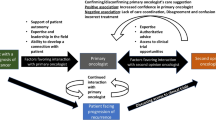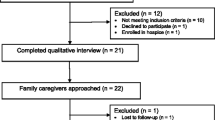Abstract
Although lung cancer is the leading cause of cancer death in the USA, there have been few studies on patient-centered advanced lung cancer treatment practices. As part of a larger research study on how to use a patient-inclusive approach in late-stage lung cancer treatment, this present study describes patient, caregiver, and provider perspectives on the role of the health care system in helping patients cope with an advanced stage lung cancer diagnosis. Four focus group sessions were conducted with six to eleven participants per group for a total of 36 participants. Two focus groups were held with patients and family members/caregivers and two with physicians and nurses. A major theme that emerged concerned coping with an advanced lung cancer diagnosis, which is the subject of this paper. The patients, caregivers, and providers spoke passionately about interactions with the health care system and volunteered examples of supportive and non-supportive relationships between patients and clinicians. They advocated for better patient-provider communication practices as well as the expanded use of patient navigation and new patient orientation programs. This study contributes additional knowledge by including the perspectives of caregivers and providers who live and work closely with patients with advanced lung cancer. The findings can inform the development of comprehensive patient-centered care plans for patients living with an advanced lung cancer diagnosis.
Similar content being viewed by others
References
American Cancer Society (2014) Available from: http://www.cancer.org/acs/groups/content/@epidemiologysurveilance/documents/document/acspc-036845.pdf./ Accessed on March 5 2015
Goodwin P, Shepherd F (1998) Economic issues in lung cancer: a review. J Clin Oncol 16(12):3900–3912
Kutikova L, Bowman L, Chang S, Long S, Obasaju C, Crown W (2005) The economic burden of lung cancer and the associated costs of treatment failure in the United States. Lung Cancer 50(2):143–154
Temel J, Greer J, Muzikansky A, Gallagher E, Admane S, Jackson V et al (2010) Early palliative care for patients with metastatic non–small-cell lung cancer. New Engl J Med 363(8):733–742
Choy E, Chiu A, Butow P, Young J, Spillane A (2007) A pilot study to evaluate the impact of involving breast cancer patients in the multidisciplinary discussion of their disease and treatment plan. Breast J 16(2):178–189
Coulter A, Elwyn G (2002) What do patients want from high-quality general practice and how do we involve them in improvement? Br J Gen Pract 52(Suppl):22–26
Institute of Medicine (2014) Available from: http://www.iom.edu/~/media/Files/Report%20Files/2011/Patient-Centered-Cancer-Treatment-Planning/Patient%20Centered%20Cancer%20Plan%202011%20WH.pdf. Accessed on March 5, 2015
Rutten L, Arora N, Bakos A, Aziz N, Rowland J (2005) Information needs and sources of information among cancer patients: a systematic review of research (1980–2003). Patient Educ Couns 57(3):250–261
McWilliam C, Brown J, Stewart M (2000) Breast cancer patients’ experiences of patient–doctor communication: a working relationship. Patient Educ Couns 39(2):191–204
Andreassen S, Randers I, Naslund E, Stockeld D, Mattiasson A (2006) Patients’ experiences of living with oesophageal cancer. J Clin Nurs 15(6):685–695
Freeman H (2006) Patient navigation: a community centered approach to reducing cancer mortality. J Cancer Educ 21(1 Suppl):11–144
Robinson-White S, Conroy B, Slavish K, Rosenzweig M (2010) Patient navigation in breast cancer: a systematic review. Cancer Nurs 33(2):127–140
Northouse P, Northouse L (1988) Communication and cancer: issues confronting patients, health professionals, and family members. J Psychosoc Oncol 5(3):17–46
Conflict of Interest and Sources of Funding
This study was supported by the Patient-Centered Outcomes Research Institute (PCORI) Contract No. CE-12-11-4351. The contents are solely the responsibility of the authors and do not necessarily represent the official views of PCORI.
Author information
Authors and Affiliations
Corresponding author
Rights and permissions
About this article
Cite this article
Islam, K.M., Opoku, S.T., Apenteng, B.A. et al. Coping with an Advanced Stage Lung Cancer Diagnosis: Patient, Caregiver, and Provider Perspectives on the Role of the Health Care System. J Canc Educ 31, 554–558 (2016). https://doi.org/10.1007/s13187-015-0840-1
Published:
Issue Date:
DOI: https://doi.org/10.1007/s13187-015-0840-1




